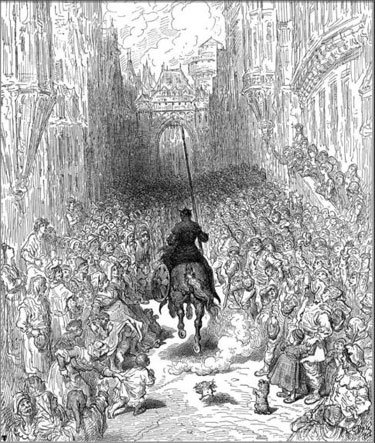From Slavoj Zizek’s How to Read Lacan:
The problem for the hysteric is how to distinguish what he or she is (his true desire) from what others see and desire in him or her. This brings us to another of Lacan’s formulas, that “man’s desire is the other’s desire.” For Lacan, the fundamental impasse of human desire is that it is the other’s desire in both subjective and objective genitive: desire for the other, desire to be desired by the other, and, especially, desire for what the other desires. Envy and resentment are a constitutive component of human desire, as already Augustin knew it so well – recall the passage from his Confessions, often quoted by Lacan, which describes a baby jealous of his brother sucking the mother’s breast: “I myself have seen and known an infant to be jealous though it could not speak. It became pale, and cast bitter looks on its foster-brother.” Based on this insight, Jean-Pierre Dupuy proposed a convincing critique of John Rawls theory of justice: in the Rawls’ model of a just society, social inequalities are tolerated only insofar as they also help those at the bottom of the social ladder, and insofar as they are not based on inherited hierarchies, but on natural inequalities, which are considered contingent, not merits. What Rawls doesn’t see is how such a society would create conditions for an uncontrolled explosion of resentment: in it, I would know that my lower status is fully justified, and would be deprived of excusing my failure as the result of social injustice.
Rawls proposes a terrifying model of a society in which hierarchy is directly legitimized in natural properties, missing the simple lesson of an anecdote about a Slovene peasant who is told by a good witch: “I will do to you whatever you want, but I warn you, I will do it to your neighbor twice!” The peasant, with a cunning smile, asks her: “Take one of my eyes!” No wonder that even today’s conservatives are ready to endorse Rawls’s notion of justice: in December 2005, David Cameron, the newly elected leader of the British Conservatives, signaled his intention to turn the Conservative Party into a defender of the underprivileged, declaring how “I think the test of all our policies should be: what does it do for the people who have the least, the people on the bottom rung of the ladder.” Even Friedrich Hayek.
Lacan shares with Nietzsche and Freud the idea that justice as equality is founded on envy: the envy of the other who has what we do not have, and who enjoys it. The demand for justice is ultimately the demand that the excessive enjoyment of the other should be curtailed, so that everyone’s access to enjoyment will be equal. The necessary outcome of this demand, of course, is ascetism: since it is not possible to impose equal enjoyment, what one can impose is the equally shared prohibition. However, one should not forget that today, in our allegedly permissive society, this ascetism assumes precisely the form of its opposite, of the generalized injunction “Enjoy!”. We are all under the spell of this injunction, with the outcome that our enjoyment is more hindered than ever – recall the yuppie who combines Narcissistic Self-Fulfillment with utter ascetic discipline of jogging and eating health food. This, perhaps, is what Nietzsche had in mind with his notion of the Last Man – it is only today that we can really discern the contours of the Last Man, in the guise of the predominant hedonistic ascetism. In today’s market, we find a whole series of products deprived of their malignant property: coffee without caffeine, cream without fat, beer without alcohol… and the list goes on. What about virtual sex as sex without sex, the Colin Powell doctrine of warfare with no casualties (on our side, of course) as warfare without warfare, the contemporary redefinition of politics as the art of expert administration as politics without politics, up to today’s tolerant liberal multiculturalism as an experience of Other deprived of its Otherness (the idealized Other who dances fascinating dances and has an ecologically sound holistic approach to reality, while features like wife beating remain out of sight)? Virtual reality simply generalizes this procedure of offering a product deprived of its substance: it provides reality itself deprived of its substance, of the resisting hard kernel of the Real – in the same way decaffeinated coffee smells and tastes like real coffee without being the real one, Virtual Reality is experienced as reality without being one. Everything is permitted, you can enjoy everything – on condition that it is deprived of the substance which makes it dangerous.
Jenny Holzer’s famous truism “Protect me from what I want” renders in a very precise way the fundamental ambiguity of the hysterical position.






